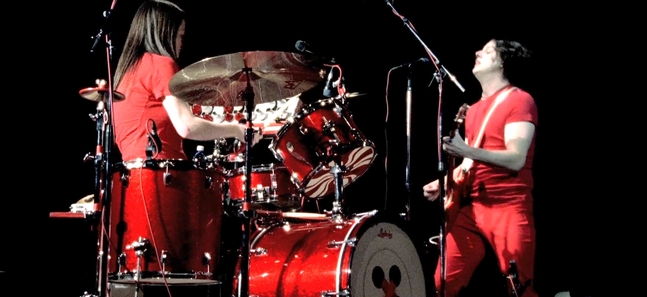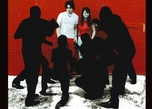Classic interview: Remembering The White Stripes
Back in 2003, Time Out scribe, Jay Ruttenberg, had Jack White for breakfast...

Posted: Thu Feb 03 2011
I live in a cramped walk-up with one small futon, no table and an uncomfortable pair of folding chairs. The walls are supermodel-thin, and my neighbors, professional Chelsea Boys, continuously threaten to transform my living room into a sweaty '80s dance club. Accordingly, guests are scarce, which renders me at nerve's end when the White Stripes accept my half-facetious invitation for morning tea.
As it turns out, I needed to wash only one mug, not two. Come teatime, Jack White — the duo's 27-year-old singer, guitarist and songwriter — arrives sans drummer, Meg White, who slipped on ice the previous night and fractured her left wrist. 'She showed me her cast this morning,' Jack grumbles. 'It was covered in tan bandages. I told her, "Couldn't they at least give you white ones?"'
If the guitarist's response seems insensitive, it's only because the White Stripes adhere to a strict color-coding policy that would make Tom Ridge proud. Since the pair began banging around Detroit in 1997 (insisting from the outset that they are siblings rather than once-weds), Jack has militantly confined their wardrobe to red, white and black. He even enters my apartment in uniform: solid-red pants and shirt, dutiful black pea coat and newsboy cap. Just as his eyes seem to be saying In Detroit, we call these broom closets, mine reveal an equally perplexed thought balloon: Hey! This dork wears his band uniform offstage!
Slouched in the living room, a blazing red ribbon ripping through my futon's gray, the solitary Stripe speaks of his determinedly sloppy band's meticulous aesthetics: 'From the beginning, we've organized ourselves around the number three.' White winces when it's pointed out that the White Stripes are, in fact, a duo, but he soldiers on nonetheless. 'Well, there's guitars, drums and vocals. Red, white and black. Storytelling, melody and rhythm. It's a universally perfect number. People die in threes. Three is the beginning of many. Focusing on it helps restrain us so we can get more primitive and honest.'
Leaving aside the couple's notorious dishonesty regarding their relationship, the pursuit of a primitive sound has long defined the White Stripes, from their 1999 self-titled debut to 2001's White Blood Cells, a characteristically raw collection of garage songs that became a surprise hit, eventually selling more than a million copies worldwide. Now, these unlikely veterans of Radio City Music Hall, the MTV Film Awards and a much-coveted Rolling Stones warm-up slot are preparing to release Elephant, the follow-up to White Blood Cells. Recorded with typical briskness and frugality in a London studio renowned for its antiquated equipment, the White Stripes' fourth album includes a rare vocal turn by drummer Meg, some elaborate overdubs and even a bass guitar (generally a White Stripes no-no).
Mostly, however, Elephant sticks to the script: crude, spare songs steeped in the same Delta blues that inspired the earliest rock & rollers. Like the Ramones — another cartoonish act that flourished in dark economic times by stripping their music bare and assuming matching surnames — the White Stripes view conventional artistic progress as detrimental to their quest for a childlike rock & roll purity. Article continues...
1 | 2
Tweets
- About Us |
- Work for Time Out |
- Send us info |
- Advertising |
- Mobile edition |
- Terms & Conditions |
- Privacy policy |
- Contact Us
Copyright © 2014 Time Out Tokyo











Add your comment